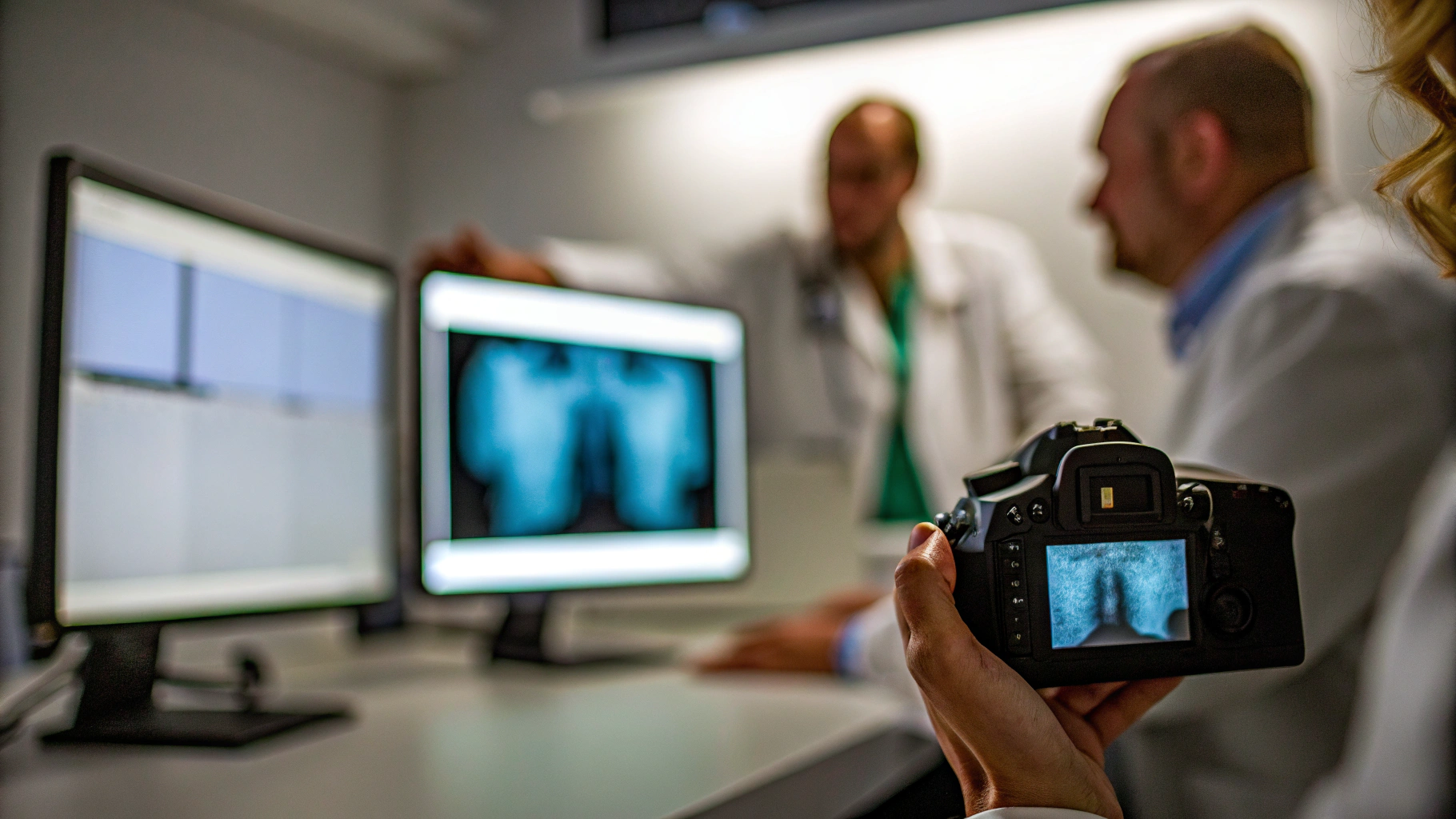10 Benefits of EDC Electronic Data Capture for Compliance Officers

Overview
In the realm of clinical trials, compliance officers face significant challenges in maintaining data integrity and regulatory adherence. Enter Electronic Data Capture (EDC) systems—an innovative solution that not only enhances data accuracy but also streamlines workflows and ensures compliance with stringent regulations.
By integrating EDC systems, organizations can dramatically reduce human errors that often plague traditional data collection methods. This technology fosters improved collaboration among teams, enabling real-time data access that is crucial for efficient trial management. Imagine the impact of having accurate data at your fingertips, allowing for swift decision-making and adherence to regulatory standards.
Moreover, the implementation of EDC systems supports a culture of compliance, where data integrity is prioritized. This shift not only meets regulatory requirements but also builds trust with stakeholders, ultimately leading to more successful trial outcomes.
To illustrate, consider a recent case study where a leading pharmaceutical company adopted EDC systems. They reported a 30% reduction in data discrepancies and a significant improvement in trial timelines. Such examples underscore the effectiveness of EDC solutions in overcoming compliance hurdles.
In conclusion, embracing EDC systems is not just a technological upgrade; it’s a strategic move towards ensuring compliance and enhancing operational efficiency. For compliance officers looking to elevate their practices, engaging with AVS Life Sciences could be the next step in achieving these goals.
Introduction
EDC electronic data capture systems are revolutionizing clinical trials by tackling the pressing compliance challenges organizations face in a highly regulated landscape. These innovative platforms empower compliance officers to enhance data accuracy, streamline processes, and uphold stringent regulatory standards. Yet, as the demand for efficiency and integrity in clinical research intensifies, organizations must ask: how can they effectively navigate the complexities of EDC implementation to achieve optimal outcomes?
This article delves into ten compelling benefits of EDC systems, shedding light on how they can elevate compliance strategies and cultivate a culture of excellence in clinical research. By understanding these advantages, organizations can not only meet regulatory demands but also position themselves as leaders in the field.
AVS Life Sciences: Enhanced Quality Compliance Through EDC Systems
AVS Life Sciences recognizes the pressing compliance challenges in clinical studies, where adherence to strict regulatory standards is non-negotiable. To tackle these challenges, the company employs EDC electronic data capture systems, which significantly enhance information integrity and streamline compliance workflows. This integration not only facilitates real-time observation and reporting but is also crucial in today’s complex clinical environments, where approximately 80% of studies face delays.
By proactively applying EDC electronic data capture tools, AVS Life Sciences mitigates risks associated with inaccuracies, fostering a culture of quality adherence throughout the trial lifecycle. This commitment ensures that all collected data meets essential regulatory requirements, ultimately supporting faster and more efficient drug development processes.
Incorporating EDC electronic data capture into clinical operations is not just a technical upgrade; it’s a strategic move towards excellence in compliance. With AVS Life Sciences, you can trust that your clinical studies will not only meet but exceed regulatory expectations, paving the way for successful outcomes. Are you ready to elevate your compliance strategy?

Improved Data Accuracy: Ensuring Reliable Clinical Trial Results
EDC electronic data capture frameworks are essential in tackling the compliance challenges that arise from manual data entry. By significantly reducing human errors, these systems enhance accuracy and reliability in clinical research. Recent studies indicate that adopting EDC technologies can lead to a remarkable 30% improvement in data accuracy and a 25% decrease in testing times. This is not just a statistic; it’s a game-changer for organizations striving for excellence in compliance.
Automated validation checks are a cornerstone of EDC systems, ensuring that data remains accurate and adheres to regulatory standards, including GXP and FDA regulations. Built-in validation rules automatically flag inconsistencies, enabling researchers to address issues in real-time. This capability not only streamlines data collection but also bolsters the reliability of clinical trial results—an absolute necessity for regulatory submissions and product approvals.
Compliance officers emphasize that maintaining high data accuracy is vital for the integrity of clinical research. It directly impacts the validity and generalizability of study results. By leveraging EDC electronic data capture platforms, organizations can ensure that their data management processes meet the stringent requirements set by regulatory authorities. This commitment promotes more efficient approval processes and enhances patient safety.
Moreover, the comprehensive computer validation process, which includes:
- Installation Qualification (IQ)
- Operational Qualification (OQ)
- Performance Qualification (PQ)
along with a detailed validation checklist, guarantees that EDC platforms are validated effectively within the regulatory framework. This rigorous approach reinforces the commitment to quality management in the life sciences sector.
In conclusion, the integration of EDC electronic data capture frameworks not only addresses compliance challenges but also positions organizations for success in a competitive landscape. Are you ready to elevate your compliance strategies and ensure the integrity of your clinical research?
Streamlined Data Collection: Accelerating Clinical Trial Timelines
EDC electronic data capture systems revolutionize information collection by automating processes and significantly reducing reliance on paper-based methods. This automation not only accelerates data entry but also enhances access to critical information, empowering clinical research teams to make informed decisions swiftly. As a result, experiments can advance more rapidly, leading to faster product development and quicker market entry.
Statistics reveal that EDC systems can shorten clinical study durations by up to 30% and reduce the time to a locked database by 43%. Furthermore, eliminating duplicate data entry and decreasing inquiries by 86% streamlines operations, allowing for more effective oversight of experimental records. Clinical study managers have noted that implementing EDC not only bolsters information integrity but also fosters a more agile response to challenges, ultimately enhancing overall study efficiency and compliance.
In terms of regulatory adherence, EDC platforms comply with GXP standards and FDA guidelines, ensuring that information integrity is maintained throughout the clinical study process. They play a vital role in addressing information integrity deviations and supporting investigations and CAPA processes. Understanding the computer validation procedure is essential, as it ensures that EDC platforms are verified at every stage, maintaining compliance and quality throughout the study.
AVS Life Sciences' integration of digitized batch processing solutions exemplifies how technology can elevate quality control and compliance in biotech. This is particularly crucial in vaccine manufacturing, where strict adherence to SOPs and effective oversight of clinical service providers are paramount for success.
In conclusion, embracing EDC electronic data capture systems not only addresses compliance challenges but also positions organizations to thrive in a competitive landscape. Are you ready to enhance your compliance strategies with AVS Life Sciences?

Real-Time Data Access: Facilitating Informed Decision-Making
EDC electronic data capture systems empower clinical study teams by providing real-time access to essential information, which is crucial for continuous monitoring of study progress. This immediate availability of information facilitates the rapid identification of issues, a necessity for informed decision-making. For compliance officers, leveraging real-time data is vital to ensure that trials stay on track and meet regulatory standards, particularly in alignment with GXP and FDA regulations. As one compliance officer noted, "Real-time access isn’t merely an operational enhancement — it’s rapidly becoming a regulatory requirement," underscoring the critical nature of real-time information access.
The integration of advanced technologies, such as AI and machine learning, enhances data analysis, leading to quicker and more accurate evaluations of treatment effectiveness while bolstering security and integrity. Instantaneous information gathering accelerates decision-making, significantly impacting test results. Compliance officers emphasize that real-time monitoring is essential for fostering effective collaboration among stakeholders and preserving the integrity of the clinical process.
Moreover, comprehensive staff training is imperative to ensure adherence to data collection protocols, further supporting effective data management in clinical trials. This aligns with the detailed overview of the computer validation process, which includes stages such as:
- Installation Qualification (IQ)
- Operational Qualification (OQ)
- Performance Qualification (PQ)
A thorough checklist for the computer validation process ensures that setups are validated and compliant with industry standards, reinforcing the commitment to excellence in clinical research.

Regulatory Compliance: Meeting Industry Standards with EDC
EDC frameworks are meticulously crafted to meet critical regulatory standards, such as FDA 21 CFR Part 11 and ICH GCP guidelines. Organizations that implement these frameworks can significantly enhance their information management practices, ensuring compliance with industry regulations. This compliance is essential not only for protecting patient safety but also for reinforcing the credibility of trial results. In fact, over 90% of life-science companies identify Part 11 compliance as a fundamental focus area, underscoring its role in maintaining trust with regulatory bodies.
Moreover, EDC frameworks facilitate robust data integrity practices, which are vital for adhering to ICH GCP standards. Recent updates in regulatory frameworks emphasize the need for EDC solutions to support unique electronic signatures and secure audit trails, ensuring that all electronic records are both reliable and legally binding. Consequently, organizations utilizing EDC platforms can navigate the complexities of compliance more effectively, leading to more trustworthy and accepted clinical study outcomes.
To illustrate, consider the success of companies that have adopted EDC frameworks. These organizations not only streamlined their compliance processes but also enhanced their overall operational efficiency. By prioritizing compliance, they have positioned themselves as leaders in the industry, demonstrating the tangible benefits of adhering to regulatory standards.
In conclusion, embracing EDC frameworks is not just about meeting regulatory requirements; it’s about fostering a culture of compliance that ultimately leads to better patient outcomes and enhanced credibility in clinical research. Are you ready to elevate your compliance strategy with AVS Life Sciences?
Enhanced Data Security: Protecting Sensitive Clinical Trial Information
EDC systems are equipped with advanced security features—encryption, user authentication, and stringent access controls—that are essential for safeguarding sensitive clinical trial information. These mechanisms ensure that only authorized individuals can access vital data, thereby maintaining patient confidentiality and complying with information protection regulations.
The implementation of such robust information security measures is crucial for fostering trust among participants and regulatory authorities. In a landscape where 70% of clinical studies have reported breaches, prioritizing strong security measures is not just advisable; it’s imperative. Cybersecurity specialists emphasize the necessity for trustworthy infrastructures that can mitigate risks and ensure compliance.
Consider the implications: without these security features, the integrity of clinical trials is at stake. Organizations must act decisively to enhance their security protocols. By doing so, they not only protect sensitive information but also build confidence with stakeholders.
In conclusion, the commitment to advanced security in EDC electronic data capture systems is not just a regulatory requirement; it represents a strategic advantage that can significantly influence the success of clinical trials. Engage with AVS Life Sciences to explore compliance solutions that can fortify your security measures and safeguard your clinical data.

Improved Collaboration: Fostering Teamwork in Clinical Trials
EDC electronic data capture systems significantly enhance collaboration among clinical study stakeholders by providing a centralized platform for information sharing and communication. This connectivity allows team members to access the same information in real-time, minimizing misunderstandings and fostering better coordination. For instance, 91% of sites reported utilizing remote source access, demonstrating how technology facilitates seamless communication and information exchange.
Clinical study coordinators have noted that this centralized approach leads to improved job satisfaction, as it reduces monotonous data entry tasks and allows teams to focus on more meaningful activities. In fact, clients have experienced a 30% increase in information accuracy after implementing clinical trial edc electronic data capture tools, further underscoring the positive impact of edc electronic data capture on team dynamics and efficiency.
Moreover, the integration of electronic patient-reported outcomes (ePROs) empowers patients to engage directly in their care, enhancing both involvement and information accuracy. The collaborative environment fostered by edc electronic data capture platforms is essential for achieving significant outcomes in clinical research. As the market for edc electronic data capture solutions is projected to grow at a compound annual growth rate (CAGR) of 15.8% from 2024 to 2033, the importance of these systems cannot be overstated.

Scalability: Adapting EDC Systems to Trial Size and Complexity
EDC electronic data capture frameworks are designed with expandability in mind, allowing organizations to customize their information management solutions to the specific scale and complexity of their clinical studies. Whether overseeing a small pilot study or a large multi-center experiment, these frameworks adeptly manage varying volumes of information and processes. This adaptability is crucial for compliance officers, allowing them to maintain oversight and control, regardless of the assessment's scale.
For instance, the electronic information collection market, valued at USD 1.25 billion in 2022, is projected to grow significantly, reflecting the increasing demand for solutions capable of handling complex information across different testing phases. Compliance officers have noted that integrating edc electronic data capture platforms not only streamlines information gathering but also enhances the accuracy and reliability of study data, which is vital for regulatory compliance. As one compliance officer stated, "The ability to customize edc electronic data capture frameworks to the complexity of our studies has been essential in ensuring we meet all regulatory requirements while maintaining data integrity."
This flexibility ultimately supports the successful execution of clinical trials, facilitating timely adjustments and informed decision-making. Furthermore, by establishing robust Standard Operating Procedures (SOPs) and adhering to the phases of the computer validation process, organizations can elevate their quality management practices. This ensures that their platforms for edc electronic data capture not only scale effectively but also meet the stringent standards of the life sciences sector.

Comprehensive Reporting: Analyzing Clinical Trial Outcomes Effectively
EDC electronic data capture frameworks significantly enhance thorough reporting by consolidating information from various sources into a single platform. This integration addresses the compliance challenges faced by clinical study teams, enabling compliance officers to generate comprehensive reports that effectively assess clinical study outcomes while ensuring adherence to GXP and FDA regulations. By providing insights into experiment performance and ensuring information integrity, EDC electronic data capture platforms not only assist in informed decision-making but also improve adherence to regulatory reporting obligations.
The computer system validation process is crucial in this context. It includes critical stages such as Installation Qualification (IQ), Operational Qualification (OQ), and Performance Qualification (PQ), ensuring that systems operate as intended and meet all necessary standards. As noted by industry experts, the ability to consolidate data significantly improves the quality of insights derived from clinical trials, ultimately leading to better compliance and operational efficiency.
AVS Life Sciences' commitment to quality management practices and regulatory compliance further supports clients in navigating the complexities of the pharmaceutical and biotechnology industries. By partnering with AVS Life Sciences, organizations can enhance their compliance strategies and achieve operational excellence. Are you ready to elevate your compliance efforts? Engage with us today to explore tailored solutions that meet your specific needs.

Conclusion
Integrating EDC electronic data capture systems into clinical research addresses significant compliance challenges faced by regulatory officers. These systems enhance the accuracy and reliability of clinical trial data while streamlining workflows, enabling organizations to efficiently meet and exceed compliance expectations.
Key benefits of EDC systems include:
- Improved data accuracy
- Streamlined data collection processes
- Real-time data access
- Robust regulatory compliance
- Enhanced data security
- Better collaboration among stakeholders
By leveraging EDC frameworks, organizations can significantly reduce human errors, accelerate trial timelines, and uphold high standards of data integrity—crucial for successful regulatory submissions and patient safety.
Adopting EDC electronic data capture systems is not just a technical upgrade; it’s a strategic imperative that can lead to improved outcomes in clinical research. Organizations are encouraged to embrace these systems to enhance their compliance strategies and foster a culture of quality that drives innovation and success in the life sciences sector. Engaging with solutions like those offered by AVS Life Sciences can pave the way for a more efficient, compliant, and effective clinical trial process.
Frequently Asked Questions
What challenges does AVS Life Sciences address in clinical studies?
AVS Life Sciences addresses compliance challenges in clinical studies, where adherence to strict regulatory standards is essential. They employ EDC electronic data capture systems to enhance information integrity and streamline compliance workflows.
How do EDC systems improve data accuracy in clinical trials?
EDC systems significantly reduce human errors associated with manual data entry, leading to a 30% improvement in data accuracy and a 25% decrease in testing times. They utilize automated validation checks to ensure data adheres to regulatory standards.
What role do automated validation checks play in EDC systems?
Automated validation checks are crucial in EDC systems as they ensure data accuracy by flagging inconsistencies in real-time, which helps researchers address issues promptly and maintain compliance with regulatory requirements.
How do EDC systems impact clinical trial timelines?
EDC systems can shorten clinical study durations by up to 30% and reduce the time to a locked database by 43%, thereby accelerating data entry and enhancing access to critical information for quicker decision-making.
What is the significance of computer validation in EDC systems?
Computer validation is essential as it ensures that EDC platforms are validated effectively within the regulatory framework through Installation Qualification (IQ), Operational Qualification (OQ), and Performance Qualification (PQ), reinforcing quality management.
How does AVS Life Sciences ensure compliance with regulatory standards?
AVS Life Sciences ensures compliance by integrating EDC systems that adhere to GXP standards and FDA guidelines, maintaining information integrity throughout the clinical study process.
What benefits do EDC systems provide in terms of operational efficiency?
EDC systems streamline operations by eliminating duplicate data entry and reducing inquiries by 86%, which enhances overall study efficiency and allows for more effective oversight of experimental records.
How does AVS Life Sciences utilize technology in compliance strategies?
AVS Life Sciences utilizes digitized batch processing solutions to elevate quality control and compliance, particularly in vaccine manufacturing, ensuring strict adherence to standard operating procedures (SOPs).
